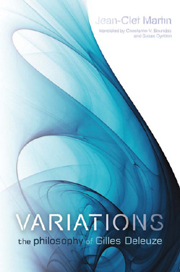Book contents
- Frontmatter
- Contents
- Letter-Preface by Gilles Deleuze
- Preambles
- First Variation: Ethics and Aesthetics
- Second Variation: Three Poetic Formulas for Nomadic Distribution
- Third Variation: Multiplicities
- Fourth Variation: Malcolm Lowry, or, the Manifesto of Things
- 1 The March Towards Death
- 2 Mannerisms
- 3 For a Microphysics of Qualities
- Postscript to the Anglo-American Edition: What is a Multiplicity?
- Notes
- Bibliography
- Index
1 - The March Towards Death
from Fourth Variation: Malcolm Lowry, or, the Manifesto of Things
Published online by Cambridge University Press: 12 September 2012
- Frontmatter
- Contents
- Letter-Preface by Gilles Deleuze
- Preambles
- First Variation: Ethics and Aesthetics
- Second Variation: Three Poetic Formulas for Nomadic Distribution
- Third Variation: Multiplicities
- Fourth Variation: Malcolm Lowry, or, the Manifesto of Things
- 1 The March Towards Death
- 2 Mannerisms
- 3 For a Microphysics of Qualities
- Postscript to the Anglo-American Edition: What is a Multiplicity?
- Notes
- Bibliography
- Index
Summary
‘[There are] forces in man which cause him to be terrified of himself.’ Malcolm Lowry's declaration is what motivates his literary existence, because, in his case, literature can no longer be conceived as a biographical act that reduces life to one simple, personal expression. Under the Volcano unmistakably contains biographical elements, in the sense that each of these elements helps to introduce points of rupture in the orderly course of a personal life. Biographical elements are equivalent to the elements of a curve that carry the constituted subject and his or her personal history along a broken line with inflections that determine very special becomings. These becomings are precisely the sort of thing that Deleuze attempts to individuate under the name of ‘haecceity’; that is, they are processes of an impersonal singularization. ‘Biography’, therefore, means something more than a simple retrospective sequencing of personal events that affect life. Biography is actually about events, but there are two ways to approach them: the first attempts to gather, in a chronological manner, their effectuations in states of affairs, and their actualization across a personal history, in order to assign motives and incentives for actions; the other entails ascending to the event until we reach the problematic points that surround it, and the halo of singularities whose immanent direct expression it designates, as it outlines endlessly asubjective issues and possibilities for a life beyond personal effectuations. Biography can be seen as an art form that traces the core of a network of abstract lines that consciousness will never integrate into the screen of personality.
- Type
- Chapter
- Information
- VariationsThe Philosophy of Gilles Deleuze, pp. 177 - 190Publisher: Edinburgh University PressPrint publication year: 2010



